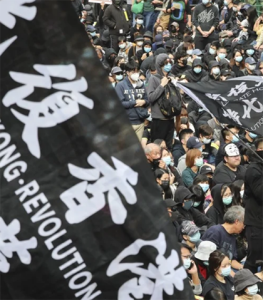Hong Kong refugees struggle to find acceptance
Many Hong Kong refugees who have sought asylum in Taiwan are showing signs of trauma and struggling to adapt to life in a new place, according to a new report.
Many of the victims were beaten by Hong Kong police, or had friends or family were shot or killed during the protests, the report said.
 Their experiences have left them scarred and unable to return to where they came from.”
Their experiences have left them scarred and unable to return to where they came from.”
“Many Hong Kongers who participated in anti-extradition protests in 2019 saw support for Hong Kong expressed in Taiwanese media, and by Taiwanese politicians in the run-up to the 2020 presidential election,” the report by the Taiwanese journal Academia Sinica, said.
“These people thought that there would be plenty of social support for them in Taiwan, but after coming here they found that most Taiwanese don’t really care about Hong Kong.
“Those who fled to Taiwan from Hong Kong have had trouble finding a secure social network, and often find themselves feeling lonely with their hearts remaining in Hong Kong.
Some of the asylum seekers came to Taiwan shortly after the protest movement started, others applied after the introduction of Hong Kong’s National Security Law.
Yet more found themselves unable to leave Hong Kong at all after its government implemented strict border controls to stem the spread of the COVID-19 pandemic.
“Some of those who made it to Taiwan safely feel guilty that they were able to leave while others are still trapped in Hong Kong. Taiwanese are unable to understand those feelings,” the report said.
It says there is frustration among Hong Kong refugees in Taiwan stemming from feeling powerless to face up to the Chinese Communist Party, which destroyed the freedoms that Hong Kong enjoyed in the past.
“Most Hong Kongers of all age groups experience difficulties finding suitable employment and adapting to life. Some have opted to return to Hong Kong, only to be arrested when they arrive.”
Academia Sinica researcher Peng Jen-yu said there are concerns that Hong Kong refugees who experience trauma due to political violence could turn to drugs or alcohol, or become suspicious of others.
“Some people who participated in the protests have witnessed partners or friends being injured by the police while they are powerless to help,” Ms Peng said.
“They also might have family members who don’t support their participation in the protests,” she said
Some Hong Kong refugees reported being ostracised by their families, comparing the situation to protesters involved in Taiwan’s Sunflower movement who were scolded by parents and relatives for their involvement.
In some cases, Hong Kong refugees who were at the protests knew that police had made a record of their participation, so they decided to flee to Taiwan while they could, Ms Peng said.
“Some were lucky enough to have family support, and their families sometimes send them money, but others are not so lucky and must rely on nongovernmental organizations for assistance,” she said.
The number of Hong Kong refugees who came to Taiwan and who see a future for themselves in the country is relatively low, with most seeing Taiwan as a temporary home, Ms Peng said.












